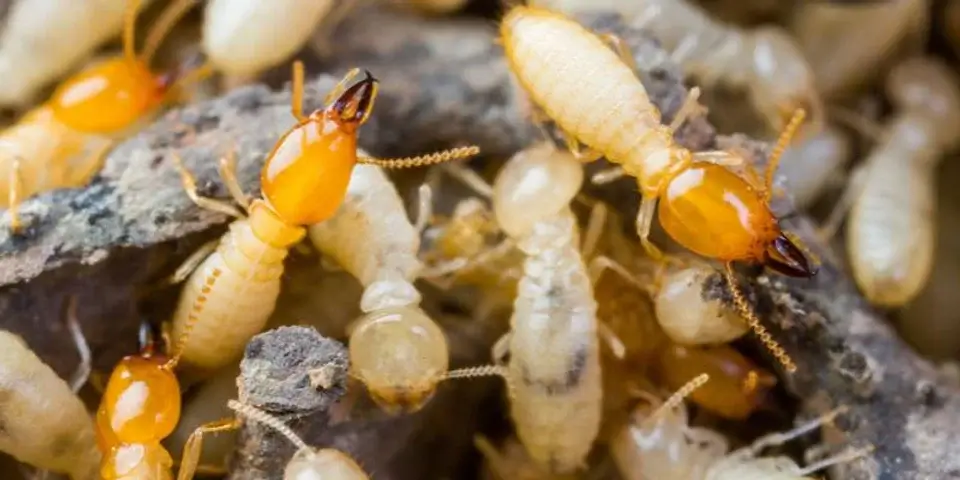
Termite Control in Tennessee
Causing more structural damage of any other pest in North America, termites are not an insect you want infesting your home – Termite control is an investment for you and your family. Whether you suspect an infestation or simply want to take a preventative approach, the experts at Golden Circle can help. We’ve been exterminating and preventing termite infestations since 1974, so you can trust you’re in the most experienced hands possible.
Termite Behavior
Termites are “social” insects that live in large colonies. These colonies have distinct castes, each serving specific roles. The castes typically include workers, soldiers, and reproductive members (including the king and queen). The “working” termites are the most abundant caste and are responsible for foraging, constructing and repairing their nests, and caring for the young. The “soldiers” have unique, specialized features such as larger heads and powerful jaws that they use to defend their colony. The “reproductives” are responsible for establishing new colonies through swarming and mating.
What Damages Can Termites Cause?
Termites can cause significant damage to structures, furniture, and other cellulose-containing materials. The damage they inflict is primarily due to their feeding habits and their ability to break down cellulose with the help of specialized gut microorganisms. Common signs of termite damage include hollow-sounding wood, sagging floors or ceilings, discolored or blistered paint, and discarded wings near windows or light sources.
The extent and speed of damage depend on factors such as termite species, colony size, environmental conditions, and proximity to suitable food sources. If left untreated, termite infestations can compromise the structural integrity of buildings, leading to costly repairs and potentially unsafe living conditions.
Termite Prevention Tips and Tricks
- Eliminate or reduce moisture in and around the home. Our team can also help with moisture treatment if you find it difficult to find ways to reduce the moisture in your home.
- Repair leaky faucets and broken or leaky water pipes, and maintain your exterior AC units.
- Repair and maintain your roof shingles.
- Repair and maintain weather stripping, loose mortar, sealants, caulk, and other areas around your basement foundation, windows, and doors.
- If possible, properly use gutters, French drains, splash blocks, downspouts, and other tools to divert water away from your house.
- Mud tubes are common signs of termites. Termites use “mud tubes” to reach a food source. You can tell a mud tube is present by seeing uneven or bubbling paint, wood, or other material. Wood will often sound hollow if tapped.
- Keep watch on all exterior wooden surfaces around your home or other property such as sheds and garages. These surfaces can be doorframes, doors, window frames, siding, baseboards, frameworks, and other structures.
- Where possible, try to maintain a 12-to-18-inch gap between soil and any wooden surfaces of your home.
- Schedule a professional, annual inspection. Termite damage is not often covered by homeowners insurance policies and having a professional inspection done can help reduce the risk of unknown damage caused by termites in the future.
- Store firewood at least 15-20 feet away from your shed, house, firepits, and other areas you frequently use.
How Many Kinds Of Termites Are There?
Termites, often referred to as “silent destroyers,” are small insects that can cause significant damage to homes and structures if left unchecked. Understanding the different types of termites is crucial for effective termite control and prevention. In this article, we will explore the three main categories of termites and delve into the various species within each category.
Subterranean Termites
Subterranean termites are the most common and destructive type of termite. They live in underground colonies and build mud tubes to access above-ground food sources. Within the category of subterranean termites, one notable family is Rhinotermitidae. This family includes species such as Coptotermes formosanus, Reticulitermes flavipes, and Reticulitermes hesperus. These termites are known for their aggressive feeding habits and their ability to cause extensive damage to structures.
Drywood Termites
Unlike subterranean termites, drywood termites do not require contact with soil. They infest dry wood and establish colonies within it. Kalotermes flavicollis is a species of drywood termite commonly found in Europe. These termites can be particularly challenging to detect as they produce small, pellet-like droppings called frass, which can indicate their presence.
Dampwood Termites
Dampwood termites thrive in damp or decaying wood and are less common than subterranean and drywood termites. They require high moisture levels to survive and usually, infest wood that is in contact with the ground. One notable family within this category is Termopsidae, which includes the species Zootermopsis angusticollis. Dampwood termites are typically larger in size compared to other termite species.
Other Termite Families and Species
In addition to the main categories mentioned above, several other families and species are worth exploring:
● Termitinae: This subfamily includes termites that primarily feed on grass and plant materials. They are known for building impressive mounds in open savannah habitats.
● Termitidae: Also known as “higher termites,” these termites have advanced social structures and construct elaborate nests. They play important roles in nutrient cycling and soil formation.
● Hodotermitidae: Hodotermitidae termites are often found in drier regions. They have distinct long, tube-like structures on their heads called nasutes, which they use for defense.
● Kalotermitidae: Within this family, the species Cryptotermes brevis is notorious for infesting wooden structures, furniture, and flooring. They can cause significant damage before being detected.
● Serritermitidae: Serritermitidae termites are commonly found in tropical regions. They are known for their aggressive foraging behavior and can cause damage to crops and vegetation.
● Parastyloterm: This genus includes termites that are endemic to Australia. They are often found in eucalyptus forests and play a vital role in breaking down dead wood.
Why Work With Golden Circle Exterminators?
Free Scheduled Inspections
Whether you’re currently dealing with termites or you want to prevent an infestation in the future, Golden Circle is your first choice in termite control in West Tennessee. When you work with our team of termite exterminators in Jackson, Medina, or Humboldt, you can expect:
- Prompt Service. We take pride in delivering prompt and efficient service to our valued customers. We believe in providing quick and reliable solutions to address pest problems, ensuring your satisfaction and peace of mind.
- A thorough inspection of your property, where we’ll search for any signs of present termites, as well as conditions that may make your home more susceptible to these insects.
- A friendly technician to discuss his or her findings with you, pointing out any issues you may have around your property, termite related or not.
- A customized termite extermination and prevention plan that works with the unique needs of your home. No two homes are the same, and we put that into consideration when crafting your custom treatment plan.
Save Money By Protecting Your Home Today
With over 50 years of experience dealing with termites in Tennessee, our exterminators utilize the most up-to-date and effective treatments on the market. Here at Golden Circle, we use Termidor — a liquid treatment for both our termite control and prevention processes. Our processes are thorough and effective.
Protection Against Subterranean Termites
Did you know that when termites infest a home, their colony can reach upwards of hundreds of thousands of termites? Over time, subterranean termites, the most damaging species of termites in Tennessee, can cost thousands of dollars causing significant damage to the structural integrity of your home. Here at Golden Circle, we’ll put a stop to these damaging insects, protecting your home for years to come.
You’ll Hardly Notice We Were There!
After we apply our highly effective termite treatments, we always make sure to clean up around the treatment site, leaving no mess or cleanup. Our goal is to ensure your home is protected from termites without disrupting your home life whatsoever.
Local, Honest Technicians You Can Trust
When you team up with Golden Circle, you will have a team of termite control professionals who are experts in our local landscape and the most common termite species found in Tennessee. All of our technicians are state certified and undergo continuing education to ensure our employees are some of the best in the industry.
What’s more, we always put our customers’ satisfaction first, offering a retreatment guarantee. If you’re unhappy for any reason, let us know, and we’ll come back to your home. With our seven-year average customer lifespan, we know that you’ll be happy you chose Golden Circle Exterminators for your termite control needs. Contact us today


